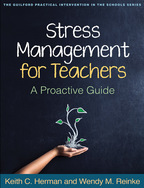Stress Management for Teachers
A Proactive Guide
Keith C. Herman and Wendy M. Reinke
A Paperback Originale-bookprint + e-book
A Paperback Original
orderNovember 6, 2014
ISBN 9781462517985
Price: $43.00 256 Pages
Size: 8" x 10½"
Ideal for use in teacher workshops, this book provides vital coping and problem-solving skills for managing the everyday stresses of the classroom. Specific strategies help teachers at any grade level gain awareness of the ways they respond in stressful situations and improve their overall well-being and effectiveness. Each chapter offers efficient tools for individuals, as well as group exercises. Teachers’ stories are woven throughout. In a convenient large-size format, the book includes 45 self-monitoring forms, worksheets, and other handouts. Purchasers also get access to a Web page where they can download and print the reproducible materials.
This title is part of The Guilford Practical Intervention in the Schools Series, edited by Sandra M. Chafouleas.
“Teachers are besieged by criticism from the press and politicians, and by pressure from parents and principals. In addition, they have to make scores of instantaneous decisions hour by hour, day after day. That is where this book comes in. It illustrates how teachers can take care of themselves and thrive under stressful, often unsupportive conditions. Written by two brilliant, knowledgeable, and calm educators, this book is a 'must' for teachers who want to be at the top of their game. Teachers' careers depend on confidence and an ability to manage pressure, and they owe no less to their students and themselves.”
—Randy Sprick, PhD, Director, Safe and Civil Schools
“This well-written, organized, and compelling book offers practical strategies to address the troubling phenomenon of teacher stress. Combining clinical insight, current research, and their extensive work with teachers, Herman and Reinke’s unique approach focuses on building teacher resilience. The book is an exceptionally valuable resource for school psychologists, consultants, counselors, and administrators who support teachers. It would also make an excellent text for education students as part of their field experience and teaching internship program.”
—Lori Newcomer, PhD, Department of Educational, School, and Counseling Psychology, University of Missouri
“Stress Management for Teachers taught me how to turn those sometimes-negative thoughts into positive ones. Learning to be aware of my thoughts and feelings throughout the day, and changing what goes into my body, have both had a vital impact on my mood and perceptions of myself. This book helped me create a positive cycle in my life that has not only improved my attitude toward teaching, but also has made me feel more successful in my personal life.”
—K. Gilchrist, MEd, NBCT, third-grade teacher, McCurdy Elementary School, Florissant, Missouri
“I recommend this book to first-year teachers, tenured teachers, and even seasoned administrators. It helped me—and will help others—reflect on how to handle the stress of being an educator or administrator. It is written in a way that enables the reader to apply the tools and strategies right away and over the long term.”
—Victoria Ballew, MEd, Director of Special Programs, Southern Boone County (Missouri) R-1 School District
“Administrators are always watching for credible and innovative resources to assist staff with pressing concerns, and helping educators cope with stress is at the top of the list. This book provides a path forward for those who are ready to do the work to reduce their stress. It is easy to read, gives clear directions and examples of useful techniques, and incorporates reflections from educators as they come to understand and address the impact of stress in their professional and personal lives. The 'If you only do one thing'sections recognize the busy lives of educators and give short, meaningful take-aways with the highest-yield strategies from each chapter. This is a useful text for teacher preparation programs, programs addressing prevention and mental health in schools, and teacher-mentoring activities.”
—Lou Ann Tanner-Jones, PhD, NCSP, Director of Special Services, Columbia (Missouri) Public Schools
Table of Contents
I. Overview of Stress and Coping1. Background and Rationale
2. Stress: The Good, the Bad, and the Lion
3. The Teacher Coping Model
II. Coping Strategies
4. Awareness
5. Adaptive Thinking I: The Positive/Negative Thoughts Method
6. Adaptive Thinking II: The ABC Method
7. Adaptive Behaviors
8. Competence and Self-Efficacy
9. Beyond Survival: Getting to Good
III. Applications and Extensions
10. Specific Applications
11. Coping with Serious Symptoms
12. For School Administrators and Other School Professionals
13. Setting Up a TCM Study Group
14. Your Personal Development Plan and Broader Systems Change
References
Index
About the Authors
Keith C. Herman, PhD, is Professor in Counseling Psychology at the University of Missouri and Co-Director of the Missouri Prevention Center. Much of his work focuses on working with teachers and families to promote effective environments for children. He presents nationally and has published over 80 peer-reviewed articles and chapters and four books on effective practices in schools.Wendy M. Reinke, PhD, is Associate Professor in School Psychology at the University of Missouri and Co-Director of the Missouri Prevention Center. She developed the Classroom Check-Up, an assessment-based, classwide teacher consultation model. Her research focuses on preventing disruptive behavior problems in children and increasing school-based implementation of evidence-based practices. Dr. Reinke presents nationally, has published over 50 peer-reviewed articles, and has coauthored four books on teacher consultation and effective practices in schools.
